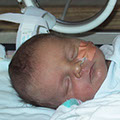 About Margot
About Margot
Born in 2000, Margot went straight into the NICU for a month
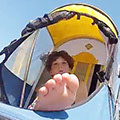 GoPro Hero
GoPro Hero
Everyday, incredible
accomplishments captured on video
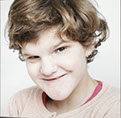 Smile!
Smile!
3 providers, 4 months, 5 appointments, too many phone calls, to fix 1 cavity
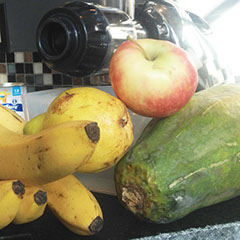 Real food, real meals
Real food, real meals
From drip-feeding a chemical blend to real food. Recipes included!
 No "Can't Do"
No "Can't Do"
A new video challenging assumptions about what Margot can enjoy and do.
 Siege or surrender
Siege or surrender
On a Christmas trip to the tropics, I waved a white flag to our new reality.
 Prisoner of Routine
Prisoner of Routine
Creating functional & fun routines took lots of effort but salvaged our sanity.
 Trail Adventures
Trail Adventures
A blog for the Rails to Trails Conservancy offers tips to help hit the trails.
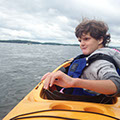 Leap of faith: Act I
Leap of faith: Act I
My hopes took a hit, so I needed inspiration to take risks again, like kayaking.
 Leap of faith: Act II
Leap of faith: Act II
Inspired to kayak? From idea to implementation, and a lesson for research.
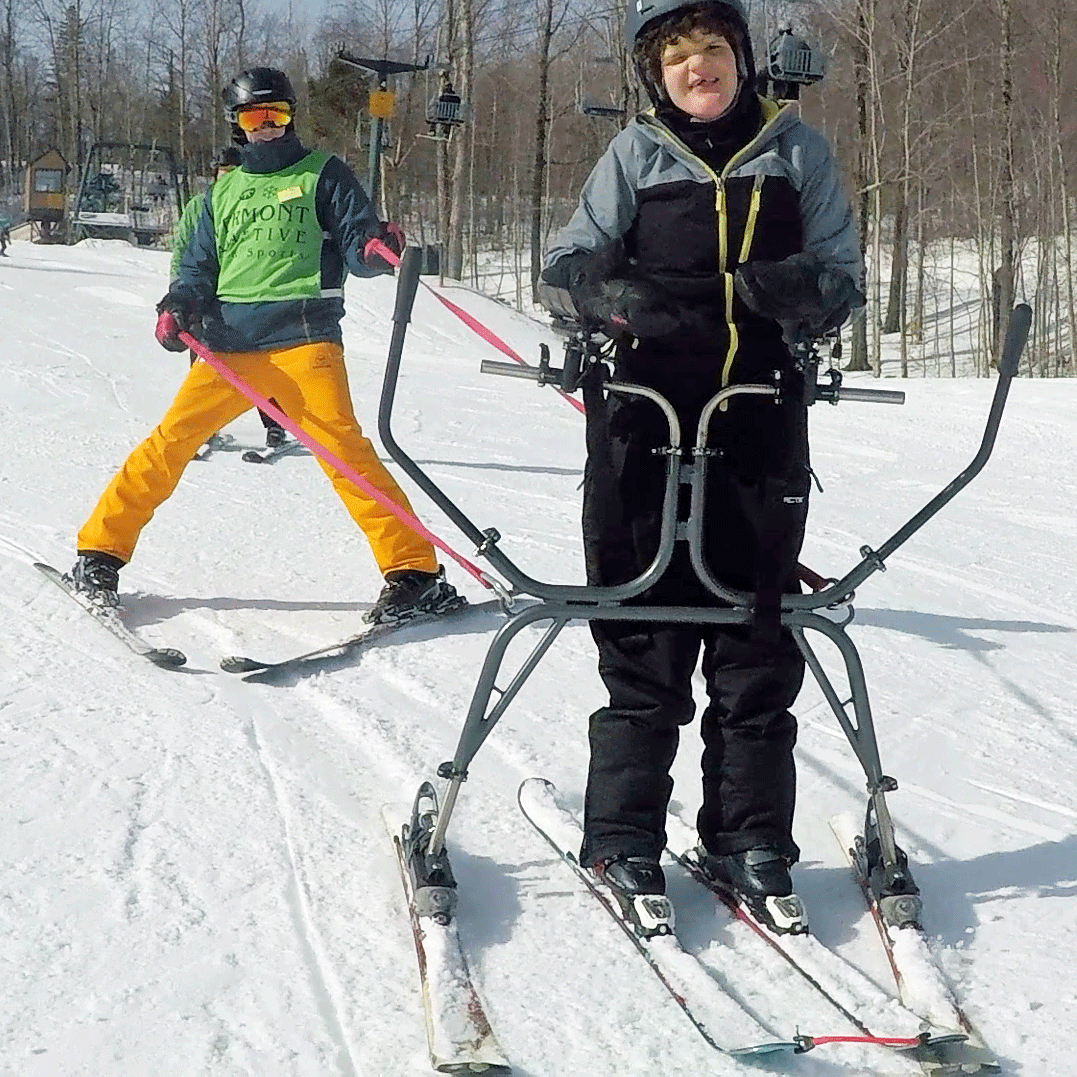 It's all downhill!
It's all downhill!
Can Margot learn to ski? With expert help and sensible teaching, yes!
 Best summer ever!
Best summer ever!
After 18 years, getting summer right for Margot and the whole family!
A Prisoner of Routine
What it took to create daily routines for our family that are functional and fun, and what it will take to do this for other families
December 30, 2016
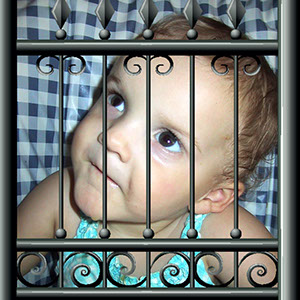 Over the centuries, people across the world have sought solace in every kind of saint, meaning in every type of myth, and inspiration from every manner of immortal. There is a sacred figure for everything; life, longing, laughter, lust, love... But there is no myth, saint, or god for that most essential need of families living with ASD... the mundane but functional routines that restore order to a home life turned upside down by disability.
Over the centuries, people across the world have sought solace in every kind of saint, meaning in every type of myth, and inspiration from every manner of immortal. There is a sacred figure for everything; life, longing, laughter, lust, love... But there is no myth, saint, or god for that most essential need of families living with ASD... the mundane but functional routines that restore order to a home life turned upside down by disability.
Routine's closest counterpart - Erin, the Greek goddess of Chaos - certainly loved visiting us after Margot was born. But where was the Goddess of Routine that guides parents of children like Margot through the mysteries of successful daily toileting, bathing, feeding, and shopping routines? Why isn't there a story of Zeus helping a parent design a program so that their child did not fall asleep too late or wake up too early? Was it more important for Zeus to impregnate the mothers, wives, and daughters of his acolytes? Or (as I suspect) maybe even Zeus knew he would have met his match in someone like Margot.
A Goddess called Routine... ridiculous! But for a long time, I was baffled by an unquestioning devotion to certain daily routines I witnessed in some parents of children with ASD. They completely disintegrated when we suggested something different for their child. We were infidels for proposing to change the video their daughter watched over and over, or to switch brands of chicken nuggets. One family brought their son to the same mall after school, every day, for years.
These routines were the distant, dysfunctional cousins of healthy routines that we all depend on daily. The consistency important to initial success had long ago devolved into incomprehensible inflexibility that seemed to go far beyond the rigidity inherent to autism. It made no sense that these parents should be so fearful of changes to these routines, given how adaptable their children had become in their time with us at school. Both children and their parents had become addicted, sacrificing spontaneity and novelty on the altar of Routine, the most mysterious of things.
Sometimes a family does not understand that the birth of Routine is not mysterious at all, but grows directly from their own child. How? A child with disability just does more of what they wanted and their parent simply follows the child's lead, grateful to find something that their child enjoys (at least for now). Over time, the child's behavior effectively shapes the parent, until a new Routine is born. And if the parent does not remember or comply with the Routine, the child just needs to act out a bit to put the parent back in line.
Whether the parents had stumbled on the Routine, or the Routine grew from the child, too many parents sometimes seem powerless to change it. And I witnessed a very disturbing pattern among our most challenged families, when their daily routines at home - and then in the classroom - became a prison. Whatever solace might be found in the few remaining daily routines is overtaken by the boredom of an increasingly restricted life. As the walls of this prison close in further and further, some children discover comfort in debilitating self-injury, while others discover excitement in explosive aggression and destruction. This accelerates as schools and parents restrict the child to the home or to their home classroom, fearing for their safety. And so Chaos threatens to returns to reign, but now with Despair at her side.
When Margot was born, I too saw the light, and briefly worshiped Routine who first led me from Chaos and Despair. We also began by desperately following Margot's lead, eager to discover what she enjoyed and to do more of it, and gladly allowing our routines to be shaped by Margot's behavior. We were baptized through the essential, daily routines we developed for life at home, like feeding, sleeping, toileting, and bathing. For a while it seemed like we were a prisoner in our own house to Margot's routines, but it was really that we were just doing what we could to get by, because we did not yet know any better. We clung to our few successful daily routines like a survivor of a shipwreck clinging to the wreckage.
It took years to assemble a basic repertoire of routines to shepherd us through each day, and this became one of the keys to our salvation. Then we slowly evolved other routines to explore things Margot might enjoy out in the community (like a trip to the playground and shopping at the supermarket). Instead of being slaves to Routine, we have become its master, and married it with a "No Can't Do" attitude to assemble routines that create adventures for Margot. We might have been shipwrecked and lost at sea, but we have now gathered enough flotsam to build a life raft, and we are paddling towards a not-so distant shore.
So how did this happen? Developing adaptive and flexible home and community routines for children with ASD and related conditions does not require highly experienced ASD professionals. We just needed a little science, a lot of observation, and the steady hand of someone with a bit of ASD training and the time to troubleshoot problems. But without this steady hand, parents may have little choice but to sacrifice their sanity on the altar of Routine.
Building functional routines for the home
Strategies: Not Rocket Science
Let's start with the not-rocket science... The evidence has been in for at least a decade: we know how to help children with ASD and related conditions to learn many of the functional routines that parents need at home and in the community. Many of the same evidence-based teaching strategies for teaching skills (like reinforcement, prompting, visual supports) and for responding to behavior problems (like positive, proactive, and function-based interventions) in schools are easily adapted for the home. When children do not demonstrate these skills in school, it is a failure of implementation: teachers lack the necessary training (especially in core techniques of Applied Behavior Analysis), struggle to provide intense-enough instruction, or set other priorities because they fail to grasp the impact on families. I tried to address some of these gaps in a graduate ASD seminar I developed for teachers. The capstone project centers on the development of a plan to extend the successful application of evidence-based practices in school to a persistent challenge faced by the parent in the home.
Despite the well-established science of teaching, the implementation gaps in the home are immense. No system of care in the United States reliably and effectively provides the kind of training that parents of children like Margot need to create successful home routines. Parents lucky enough to receive early intervention find that providers usually focus on direct services to the child. Most schools can barely manage to provide the most basic training mandated for teachers, and so have little incentive to address parent training, which is rarely funded and never mandated. Home-based or wraparound services funded by Medicaid or insurance have the greatest potential, but often fail to realize this for reasons to be discussed later. As the director of a well-established statewide public school program, I could not develop a parent training program intense enough to make a difference, without compromising the success we had established in the classroom. As Margot's father, throughout the 14 years she has attended specialized early intervention and school programs, I have never been offered any program of parent training, even though I live in one of the wealthiest counties in the Commonwealth.
Consider the functional morning routine we have developed for Margot. It works reliably before she goes to school on weekdays and up until 10AM on weekends. It starts every day off successfully at home, and allows us to travel because now we can reliably replicate it elsewhere. It builds on several smaller routines we have established over the years, each of which only required patient application of basic teaching strategies. There are routines for her toileting and her feeding. There are routines around household chores and play. In fact, I am relying on this morning routine right now, to carve out an hour to assemble these paragraphs. We have evolved - and continue to evolve - these routines slowly as Margot's needs and interests change, but without any guidance from outside professionals.
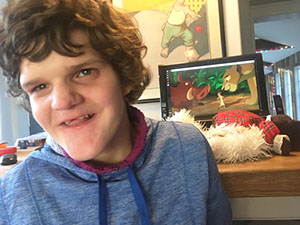 While some of these built on successes established at school (like toileting), others we have added completely on our own. For example, Margot demands a lot of attention, and she can get caught up being bad if we are not vigilant about catching her being good. Several years ago, we noticed that she was turning her head to stare briefly at the TV for certain shows. So I began to build a simple routine to increase the length of time she watched video clips on a computer or IPad. Over a period of several weeks, we just hung out with her in the TV room. We observed that she paid most attention to Minnie Mouse, and so we downloaded clips onto a computer. We sat next to her and began to watch with her, quietly giving her lots of attention whenever she was looking at the screen (too much attention and she would turn away to look at us). We began to give her less attention, and to step back to do other chores for 10, then 20, then 30 seconds. Then we created a Minnie icon she could use to ask for another 3 minute episode, as part of her PECS. The response to her requests functioned to ensure regular reinforcement.
While some of these built on successes established at school (like toileting), others we have added completely on our own. For example, Margot demands a lot of attention, and she can get caught up being bad if we are not vigilant about catching her being good. Several years ago, we noticed that she was turning her head to stare briefly at the TV for certain shows. So I began to build a simple routine to increase the length of time she watched video clips on a computer or IPad. Over a period of several weeks, we just hung out with her in the TV room. We observed that she paid most attention to Minnie Mouse, and so we downloaded clips onto a computer. We sat next to her and began to watch with her, quietly giving her lots of attention whenever she was looking at the screen (too much attention and she would turn away to look at us). We began to give her less attention, and to step back to do other chores for 10, then 20, then 30 seconds. Then we created a Minnie icon she could use to ask for another 3 minute episode, as part of her PECS. The response to her requests functioned to ensure regular reinforcement.
Within a year, she was watching clips for an hour or more, with significant reductions in other problem behavior that functioned to get attention. And these clips have proven useful at other times of the day and for other purposes, like waiting in the doctor's office, or on long car rides. We have expanded her repertoire to include Doc McStuffins, Sesame Street (parodies of movies and TV shows are our favorite), Toy Story, and Lion King, always in 5 - 10 minute clips so that she is guaranteed regular interaction (although she now knows how to advance to the next clip). This need was never identified by any provider who worked with Margot. Like our program to build her endurance for walking, we never would have established a routine for watching favorite videos had we left it to the professionals. And without this routine, our broader morning routine would be much more fragile..
A more significant implementation gap: Individualized programs that include coaching and troubleshooting
Recognition of the value of parent training has been steadily growing, and there is an emerging science on the best approaches. Many organizations, from schools to hospitals to advocacy groups, have begun to tackle these needs by offering an assortment of workshops to parents. Some of these workshops review general research findings or discuss how to navigate the systems of care, and so are less likely to help directly with routines in the home. Other workshops are intended to introduce parents to basic principles of intervention or even specific teaching strategies. These could help establish functional routines for home or community life, at least in theory.
Do they? I suspect not. Many of the organizations who have begun to recognize this need start by offering a fairly generic strategies over several group sessions, but then never provide the kind of follow-up needed to see if this ever really helped. For example, parent training in and of itself will fall short without the opportunity to individualize the targets and strategies to the child. A program may correctly identify the opportunity to train parents to use basic ABA strategies to build dressing, eating, and toileting routines, but parents will not know where to start without an individualized assessment of a child's preferences or baseline skills.
Practice, coaching and feedback is also essential to any training program. Sometimes the only feedback needed is encouragement to the successful parent to persist. More often, coaching is needed simply because few people master new skills just by reading about them or watching a video. These are difficult to integrate into a traditional didactic workshop.
Ongoing support can also be invaluable for children whose disabilities lengthen the runway. This should include the kind of troubleshooting needed to address the inevitable bumps along the way, or parents might become too discouraged to continue trying. And re-tooling might be needed as the repertoire of skills and routines is poised to expand beyond the initial set of strategies. A parent who tries to take off after a single workshop or a brief series of workshops will soon stall and crash.
The good news is that home-based wraparound services funded by Medicaid or insurance have a lot of potential to support the kind of individualized, intense, medium-term support in the home and the community that parents need to develop and consolidate functional routines. The bad news is that the professionals delivering these services may not be prepared. In some states, there is no real standard to ensure that those delivering the service have any truly relevant training. Professionals may have a degree or even a license in a related field, but standards rarely require coursework of internships related to ASD, or specialized training on the job. In these states, your undergraduate degree in social work or psychology qualifies you to provide wraparound support, even though you might never have seen a child with disabilities.
The news is not so bad in other states that require that services are delivered or supervised by a Board-Certified Behavior Analyst or BCBA. Their initial training is more likely to ensure that they address problem behaviors using proactive, preventative, and function-based strategies, and that they will develop measurable goals and collect data to track progress. But most BCBAs do not graduate with all of the skills and experience they need to begin practicing effectively. Though the core curriculum of BCBA certification programs does require training in many strategies relevant to teaching children with disabilities, there is no requirement for coursework or practicum experience specific to ASD. Many BCBA training programs still emphasize school-based packages focusing on traditional academic targets, and do not provide the guidance that new professionals need to adapt these to the home. I also find that collaboration between BCBAs and other disciplines and agencies to be very inconsistent, making it difficult to build on successes from school, or to consider the impact of concerns health professionals might have identified. And once they graduate, BCBAs may not receive the type of ongoing training and supervision needed to expand their repertoire.
There is a more general problem, worth a more detailed discussion at a later time. Most professionals underestimate the challenges faced by parents of children with disabilities, just like I did before Margot was born. Too often, they just conclude that there is something wrong with the parent who does not "get" the training offered, instead of questioning whether the right strategies are being used or the right priorities have been established. They will label the parent unwilling to change a routine in the home as unreasonable or anxious, before frankly considering whether the training and support they offer is truly adequate.
Is there the potential for change that could create more opportunities to train and support parents trying to build fun and functional routines in the home? Maybe, but it would likely require coordinated action at the state level. While some states have active ASD advocacy committees that may aspire to raise awareness about issues affecting families, these committees do not always include the behavioral health providers who are best positioned to deliver the services needed to help families develop functional routines in the home. And remarkably, most committees do not have a clear mandate to recommend changes to services, let alone mechanisms to monitor progress towards recommended changes. And even if they did recommend changes, very few states have created the kind of specialized ASD positions or offices within the relevant state agency to coordinate providers to prioritize certain practices.
So change is possible, but it would likely require close coordination between advocates, providers, and agency leaders. In the meantime, we may see many more parents become prisoners of Routine long before they become masters of it, if they ever do.
 About Margot
About Margot
Born in 2000, Margot went straight into the NICU for a month
 GoPro Hero
GoPro Hero
Everyday, incredible
accomplishments captured on video
 Smile!
Smile!
3 providers, 4 months, 5 appointments, too many phone calls, to fix 1 cavity
 Real food, real meals
Real food, real meals
From drip-feeding a chemical blend to real food. Recipes included!
 No "Can't Do"
No "Can't Do"
A new video challenging assumptions about what Margot can enjoy and do.
 Siege or surrender
Siege or surrender
On a Christmas trip to the tropics, I waved a white flag to our new reality.
 Prisoner of Routine
Prisoner of Routine
Creating functional & fun routines took lots of effort but salvaged our sanity.
 Trail Adventures
Trail Adventures
A blog for the Rails to Trails Conservancy offers tips to help hit the trails.
 Leap of faith: Act I
Leap of faith: Act I
My hopes took a hit, so I needed inspiration to take risks again, like kayaking.
 Leap of faith: Act II
Leap of faith: Act II
Inspired to kayak? From idea to implementation, and a lesson for research.
 It's all downhill!
It's all downhill!
Can Margot learn to ski? With expert help and sensible teaching, yes!
 Best summer ever!
Best summer ever!
After 18 years, getting summer right for Margot and the whole family!